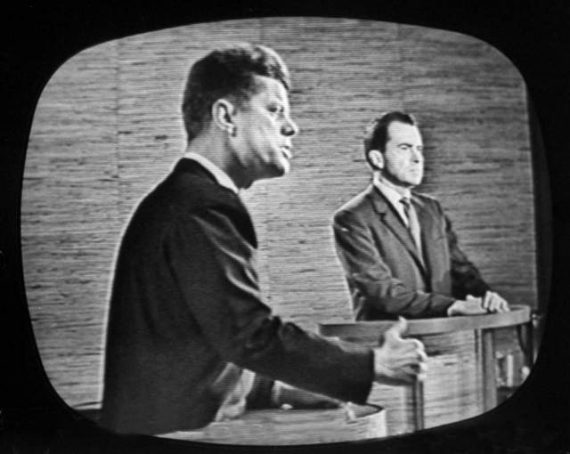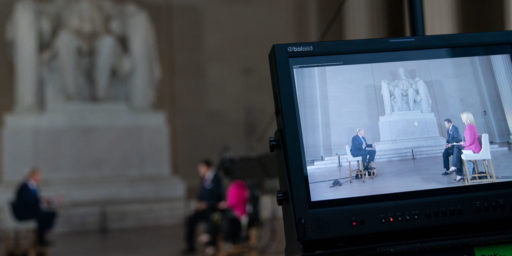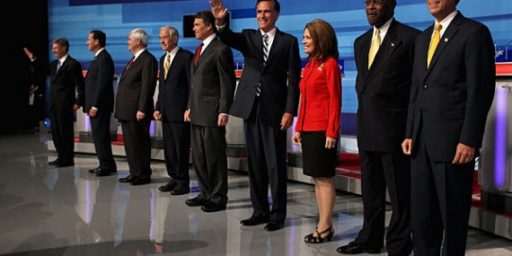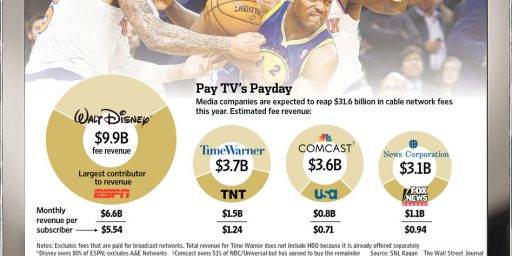Should Political Debates Be on Pay TV?
Susan Crawford claims that "Cable-Only Presidential Debates are the New Poll Tax."
Susan Crawford, a visiting professor at Harvard Law, makes the hyperbolic claim that “Cable-Only Presidential Debates are the New Poll Tax.”
The Fox News debate marked the moment when politics became indistinguishable from sport in more than just entertainment value. Just as we can’t watch most sporting events (including large swathes of the Olympics) without a cable or satellite subscription, Americans couldn’t watch the debate online unless they were part of the cable/satellite ecosystem.
As a matter of American history and civics, this should be shocking. But when I told a friend of mine that this bothered me, he said, snarkily, “Oh, right, because you can’t pay for cable. Of course you can. What’s your problem?”
So it seems to me maybe a little re-education (or myth-busting) might be useful. There are all kinds of public values at stake here, and we shouldn’t glide past them. This is the place where the increasingly blurry public/private line should, for many people, stand out in sharp relief. There is no speech more central to civic life than a political debate. And yet we have allowed access to that speech by way of the common medium of our era — high-speed Internet access — to be controlled by a cabal of private actors.
The thing is that Fox News Channel owes its existence — completely — to a federal statutory regime aimed at supporting the “public trustee” role of traditional TV broadcasters. And yet all the “public-ness” of that deal has been washed away: Fox News felt no need to ensure that online viewers could watch the debate. That meant that cord-cutters and cord-nevers — basically, Millennials and an ever-increasing chunk of Americans — whose high-speed Internet access wasn’t sold to them by a cable company had to wait for re-runs.
She continues in that vein for several more paragraphs. It is her chief argument. It is completely facile. With broadcast media, the rationale for a “public trustee” requirement was obvious: the spectrum is a zero-sum game and regulation by the government was essential. In exchange for the right to broadcast exclusively over that limited spectrum, we required conformity to various rules, including serving up a certain percentage of news, educational, emergency notification, and other public interest content free of charge. But there is no similar rationale for imposing those requirements on cable or satellite channels, for which there is essentially infinite bandwidth.
The much more compelling argument, implied by her opener and only vaguely made in her conclusion, is the notion is that certain content is sufficiently vital to the public interest that it shouldn’t depend on one’s ability (or even willingness) to pay for it. But that would require a whole scale adjustment of the American media environment.
Newspapers, arguably the most in-depth means of conveying political information to the public, have always charged money. In the Internet age, most papers are at least partially online and offer some of their content free of charge. But the most important American papers—the New York Times, Washington Post, and Wall Street Journal—are highly metered, increasingly walling off most of their coverage from those unwilling to pay for it. By Crawford’s standard, they shouldn’t be able to do that. But, given that it’s incredibly expensive to maintain a world-class news organization, someone’s got to foot the bill.
At the end of the day, the business of news has always been business. From days of Benjamin Franklin to the days of Megyn Kelly, the main goal has been to attract paying customers by some combination of news and entertainment. And the latter has always been more important than the former. There’s a reason political coverage is so driven by scandal and horse races rather than substance: it’s what most people are interested in.
Further, the “poll tax” argument[*] is as insulting as it is vacuous. While it serves the goal for which it was intended, drawing eyeballs in a hyper-competitive information environment, there’s neither a fundamental right to watch political debates live nor any great harm in those unable or unwilling to pay having to wait a few hours for the highlights.
All that said, my preference aligns with Crawford’s. In an ideal world, political debates, outstanding long-form analysis of politics, and the best public interest content would be readily available to all citizens regardless of ability or willingness to pay. I just don’t think that it’s up to Comcast, DirecTV, or Fox News to foot the bill. Public goods should be paid for by the public.
In theory, the debates could be held on PBS and simulcast on NPR and their websites. Those outlets could also be a free-access source for the best written news reporting and analysis, whether in the form of original content, licensed aggregation, or some combination. But we’d have to agree as a society that the tiny cost of funding such an operation was worthwhile.
Generally speaking, the highest quality broadcast news outlets are those not beholden to advertisers or even the whims of the audience. Public-supported venues like the BBC, PBS, and NPR can largely eschew sensationalism and over-coverage of “human interest” stories because they’re unconcerned with maximizing their appeal to casual consumers of news who tune in mostly for natural disasters, true crime stories, celebrity gossip, and breathless “Breaking News” coverage of largely irrelevant events.
In essence, though, this means that the public at large subsidizes the interests of the elite. While NPR and PBS provide a wonderful service that’s available to rich and poor* alike, they’re mostly consumed by the rich and/or very highly educated.
Additionally, a public broadcasting model would have significant second- and third-order effects. Most notably, while there’s something unsettling about Fox News or other commercial outlets deciding which candidates to invite to a national debate, it would be outrageous if it were the Federal government making that call. But not only would having all 17 “major” candidates for the Republican on the stage at one time make an already horrible debate experience even worse but there would be some question as to whether stopping at the “major” candidates was legally permissible were the government the arbiter.
_______________
[*] Two commenters rightly note that she does not explicitly make that argument in the posting itself. It’s entirely possible that someone other than the author wrote the headline. That’s generally the case with magazines and newspapers; I discounted that because this was a blog post but it’s not a personal site and may therefore by edited.
*Of course, even if access to the signal is free, people still have to provide their own televisions, Internet-capable devices, and broadband signal. Unless we’re going to give that all away for free, too.







Agreed. These debates are not time sensitive. I fail to see the harm in having to wait a couple of days to see these.
Steve
So, then, if some people have voluntarily excluded themselves from the potential viewing audience (Crawford’s “cord-cutters and cord-nevers”), should we hunt them down, drag them before a federally-funded 60-inch Samsung flatscreen, and force them to watch these brainless exercises in substanceless preening we misname as “debates?” Of course, she’s not advocating for this, it’s a strawman of my own creation…because it seems to me not having them universally available without a cable subscription is a blessing to those who can’t watch them.
Hyperbole aside, there is a germ of something interesting there. The decision to use one format rather than another, to choose one network over the rest, it does speak to who you are trying to reach. Today, the Republican Party IS the Fox News Party.
Susan Crawford, a visiting professor at Harvard Law
That pretty much says it all. Harvard professors are internationally recognized for their ability to solve problems that don’t exist.
Meh. I haven’t watched any part of a debate in decades, not even Rick Perry’s epic melt down. They aren’t very informative and slug sex is more entertaining.
Apparently the mere mention of terrestrial gastropod mollusc coitus is enough to throw my comment into moderation. A little help is appreciated.
James? You really need to fix your comment settings.
For the Republicans that’s a non-issue, cord cutting millennials are not likely voters, and people who can’t afford a subscription are not likely donors. More interesting if the Ds use a similar format.
I can’t even understand why they had a debate at this time. We are 6 months from when anything matters and then only to voters in a trickle of states. So missing the live debate and reading about/seeing the re-runs hardly matters. Perhaps you could make the argument for general election debates in September and October of the actual election year.
One thing I do wonder is why no candidate seems to be really leveraging mediums like Youtube. Sure, you can see the campaign ads run on the other side of the country, but none seem to be using it as a real get-to-know medium. Seems to me that using Youtube to put up debate position videos of 3-5 min, perhaps challenging others to respond with their positions then doing a response, could replicate real debate and really flesh out positions. And the videos don’t have to be strictly talking head, they could have some infographics, like Prager videos and others who use the medium successfully.
Going Youtube could be a good way for a struggling candidate to really enter the race and who knows, sometimes those videos go viral when they strike a cord. But it would be away to do real debate instead of the gameshow “debates” put on by the “news” organizations.
Cable TV is a dinosaur, I can get much of the cable content I might actually want to watch on my Roku unit. Cutting the cord is not really cutting the cord in this age of streaming. I’m nearly 70 and can figure this stuff out.
Cable TV is a dinosaur, I can get much of the cable content I might actually want to watch on my Roku unit. Cutting the cord is not really cutting the cord in this age of streaming. I’m nearly 70 and can figure this stuff out.
But most debates are not on pay TV. Only some of the Primary debates are. That´s much more debates than I can watch on Brazilian Television.
@JKB:
I was just compelled to up-vote you. Possibly a first.
The answers are:
1) Because normally at this point in the process candidates aren’t so much looking for voters as they are dollars. They’re a bit lost and confused because things changed.
2) There’s nowhere near enough smart campaign staff for 17 candidates to recognize that the paradigm has shifted and then react intelligently.
3) The few voters they’re supposed to be looking for at this point are a few thousand yokels in Iowa who have not yet found the YouTube channel on their console TVs. They’re still trying to adjust the wire coat hangers.
4) Most of the candidates have no idea what their positions are because their positions will be determined by polling.
One of the reasons Bernie Sanders is doing well is because he actually knows what he believes and just. . . you know. . . says it.
Trump has a version of that in that he has no idea what his positions are, but he knows Republicans want anger and scapegoating so he’s giving them anger and scapegoating. He’s chasing ratings. They aren’t voters to him, they’re viewers.
@JKB:
I’d hypothesize that the main demographic of those who access Youtube frequently is a lot younger and more liberal than the main demographic to which the GOP candidates would appeal.
That’s not to say, of course, that a well-crafted Youtube campaign wouldn’t reach some younger voters who might be swayed thereby, and I agree with you it would be a good way to reach out (and comparatively cheap, too–no need to buy TV ad time). But perhaps the campaigns have already researched this and decided to focus elsewhere. I don’t think even the GOP is so out-of-touch they wouldn’t at least think about it.
On the other hand, when you’re Donald Trump and your entire campaign is little more than substance-free dick-waving, you’re probably not capable of fleshing out anything.
@michael reynolds: Trump does not says what he believes. He says what his followers want to listen. It´s different.
It would be interesting to know what percentage of the people who don’t have cable tuned in to watch the debates when they were broadcast.
I think she’s hyperventilating.
However, I freely acknowledge that I am a radical on the subject of politics and television. I think we should have a constitutional amendment banning paid political advertisements on television. Great Britain, Ireland, Norway, Belgium, Switzerland, Italy, Germany, South Africa, Brazil, Chile, the Philippines and India, just to name a few, all have such bans. I don’t see a great deal of evidence that they’re drastically less democratic or less free than we are. Quite the contrary in fact.
@Andre Kenji:
Actually, I said that but wrote a messy sentence.
I do think that if we ended up in a situation in which all such content was on pay-for channels that that would constitute a problem, but we are hardly there at the moment.
Really, the issue that I find the most disturbing here (and she gets to in the first line James quotes above) is that this whole spectacle underscored the degree to which politics, and cable news i particular, is more about entertainment than it is about selecting capable government.
I’m of the the opinion that Professor Crawford is making an extremely tenuous and weak claim.
Times have changed and Crawford needs to get up to speed. While it is true that many people watch the debates in real time, it is also true that many people watch “highlights” and excerpts in the after-market, in and on many different outlets and media streams. I doubt that any person who is interested in politics does not have the means and where-with-all to find their way to debate content.
I see no evidence whatsoever that people are being denied valuable information if they do not pay for a cable package that provides “free” access to presidential debates.
She didn’t make the poll tax analogy anywhere in her article. She could just be the victim of a bad headline writer.
@michael reynolds: 2. There’s nowhere near enough smart campaign staff for 17 candidates to recognize that the paradigm has shifted and then react intelligently. I think you hit it here not only for the R’s but to an extent also for HRC. They could take some lessons from Obama’s campaign staffs.
James, Pinky is correct: the phrase poll tax does not appear in the article. Unless I am misremembering, you yourself habe noted complaints about editors writing their own titles for articles you have written. It seems as though you should extend the courtesy to the author of this article of arguing only against the content, not the headline.
@Pinky: @Gromitt Gunn: That’s a fair point. Given that this argument was made on a blog, I presumed she wrote her own headline. But it’s possible that “Backchannel” is edited.
@Steven L. Taylor:
Absolutely!! I don’t understand complaining about the live broadcast medium without noting that the entire event is being staged by a news/political industrial complex that has a huge investment in both the debate and the outcome (at least half those candidates on stage will end up as paid contributors to Fox in the near future, not considering how many were paid contributors at some point in the past few years).
Thinking about this and casting about for analogies my mind fastened onto the ‘notices’ that are required by law to be made public. We’ve probably all seen some of them – ‘xxxx gives notice that he will no longer be responsible for the debts of oooo” and such. Those are always in paid media.
I really don’t see that this is enough of an issue to create a stink over.
testing testing….
Earlier today I was classified as spam and totally blocked. All is well now. My guess is it had to do with my use of the s3x word in conjunction with slugs. sigh…
@Mr. Prosser:
I think Hillary’s team was smart to lay back while the Republicans made asses of themselves. But I think they let the email thing get away from them and should have tried harder to get ahead of it.
I’m still not sure how that thing plays out, so I’m not sure I’m right that they should push back harder. I don’t see their internal polls. She has no effective primary opposition yet, that could only come from Warren or maybe Biden. Right now she’s still in command of Team Blue, and right now she could handily beat any Republican with the possible exceptions of Kasich or maybe Jeb if he switches back to caffeine.
I’m not sure that she even has an issue to harp on. A friend of mine who neither subscribes to cable nor has a television watched the debate (after protesting loudly that he had no interest at all in it or what any of the candidates have to say) on streaming internet feed from somewhere.
@Ron Beasley:
“I’m nearly 70 and can figure this stuff out.”
“I’m nearly 70 and can figure this stuff out.”
Oh, the irony.
Here is an idea: the local schools and churches could provide free telecasts. In order to cover expenses and make some money, they could sell popcorn, drinks, hot dogs, peanuts, and cotton candy. They could raffle off prizes, like big screen tvs.
I have noticed that most of the antenna stations are hd, clear as satellite or cable. There are not many stations though. This represents a huge opportunity.
@James Joyner: That said, I agree with the bulk of your argument.